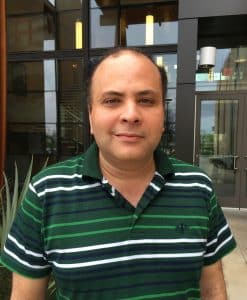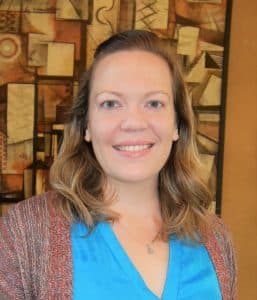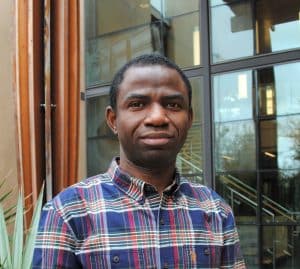The Texas Biomedical Forum is an independent, non-profit association dedicated to promoting the life-saving work of Texas Biomed. The Forum sponsors one-year pilot projects that help scientists prove concepts that can lead to subsequent and often significant federal funding of research.
The 2019 faculty Forum grant recipient is:

$60,000
Population-specific gene splicing and its role in antiviral immunity
Natural variations in the DNA of different human populations underlie variations in the way genes are translated into proteins. In other words, same gene can produce proteins with different shapes and sizes in different human populations. Dr. Ebrahimi’s preliminary data indicate that these variations are complex, common, and mostly understudied in the context of host-pathogen interactions. The aim of his proposed studies is to use advanced computational biology approaches to create a complete catalog of the relationship between gene variation and protein variation across the globe. Dr. Ebrahimi’s studies will focus on immune genes, with an ultimate goal of translating the findings into effective precision-medicine treatment strategies in near future.
The 2019 Staff Scientist Forum grant recipient is:

$60,000
CRISPR/Cas13d RNA editing system: A new scissor to clip HIV RNA
Despite extensive research over the past three decades in the development of effective interventions, HIV remains a major public health concern. Anti-retroviral treatment (ART) is currently the only option to control viral replication, although it is ineffective in the elimination of HIV. Preliminary data showed that HIV-1 RNA could be efficiently targeted using CasRx protein in combination with poly-gRNA strings simultaneously targeting four distinct conserved regions in HIV. Based on these results, Dr. Kulkarni proposes to adapt this targeting strategy to the non-human primate model of HIV infection, optimize and test its efficacy.
The post-doctoral scientist 2019 Forum grant recipients are:

Post-doctoral scientist
Chrissy Leopold Wager, Ph.D. (works in Dr. Larry Schlesinger‘s lab)
$60,000
Linking receptor-mediated phagocytosis and cAMP pathways in macrophage responses to tuberculosis
Mycobacterium tuberculosis (M.tb), the causative agent of tuberculosis (TB), is arguably the oldest known human bacterial pathogen. In 2017, an estimated 10 million people developed TB disease, demonstrating an urgent need for new approaches to therapy, including host-directed therapy (HDT), to halt infection and progression of active TB. Macrophages are among the first to encounter M.tb in the lung environment, thus it is critical to understand how M.tb modulates the macrophage response to create an environment conducive to bacterial growth. This study will use primary human macrophages to provide atranslational model for study of the MR, cAMP and PPARγ, which is critical to advance the field and identify novel potential HDTs for TB.

Post-doctoral scientist
Egie Enebulele, Ph.D. (works in Dr. Tim Anderson‘s lab)
$30,000
Exploiting museum rodent collections to understand zoonotic disease reservoirs
Some of the deadliest pathogens in human history have been a result of zoonotic transmission, like rabies, hantavirus, plague and Ebola. Natural history museums were established to document and archive the biodiversity of flora and fauna. As of 2015, natural history museums had 8 million mammalian tissue samples available for research purposes. The goal of this project is to exploit underutilized museum collections by using molecular tools to understand the natural history of zoonotic pathogens transmitted by rodents.
Cowles Post-doctoral fellowship:

Post-doctoral scientist
Juan Ignacio Garcia, Ph.D. (works in Dr. Jordi Torrelles‘ lab)
Determining the efficacy of a novel TB diagnostic test to monitor treatment success in drug resistant TB cases
Tuberculosis (TB) is the leading infectious disease cause of death worldwide. Without improved TB surveillance and diagnosis, it is estimated that drug-resistant-TB will kill 75 million people and cost the global economy $16.7 trillion over the next 35 years. Dr. Torrelles’ lab has developed a TB drug-resistance diagnostic test capable of detecting if a person is infected with a drug resistant Mycobacterium tuberculosis strain, as well as monitor if a TB patient under anti-TB drug treatment is responding well to the treatment. This new diagnostic test, 2G Color Plate test, allows for determination of whether a person is responding to the anti-TB treatment relatively quickly. This new test is not as sophisticated as current PCR-platforms, but can detect resistance to 11 TB drugs at once, is easy to use, relative faster than conventional methods, and requires no specialized equipment or highly qualified staff, and most important, provide clinicians with a missing tool to monitor drug resistant TB treatment success in a field setting. Juan Ignacio will be implementing a 2-year study in Mozambique studying the performance of this test.